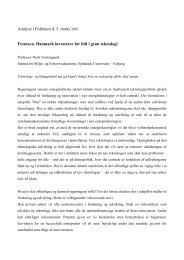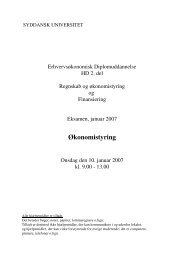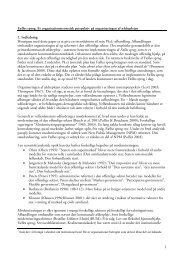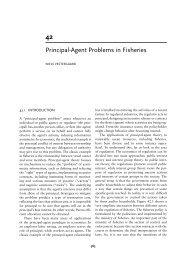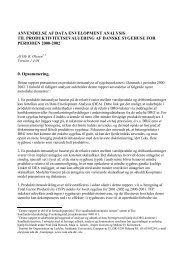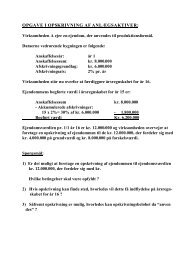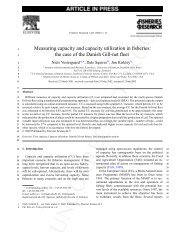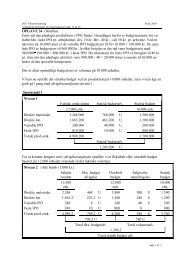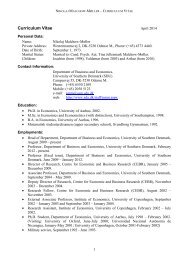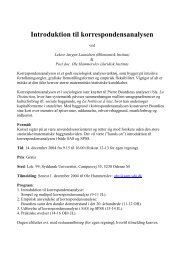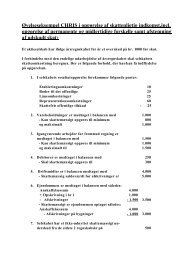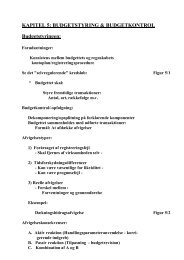Development of Parties and Party Systems in ... - lah@sam.sdu.dk
Development of Parties and Party Systems in ... - lah@sam.sdu.dk
Development of Parties and Party Systems in ... - lah@sam.sdu.dk
- No tags were found...
Create successful ePaper yourself
Turn your PDF publications into a flip-book with our unique Google optimized e-Paper software.
The League has been considered as a desperate attempt to stop the liberal “megatendency” <strong>in</strong> Polisheconomy that had been manifested <strong>in</strong> the shape <strong>of</strong>f the Balcerowicz plans <strong>and</strong> rapprochement withthe EU. Ideologically the party has declared to be neither Left or Right. “We are a catholic <strong>and</strong>national formation, for us the po<strong>in</strong>t <strong>of</strong> departure the catholic learn<strong>in</strong>g about the organisation <strong>of</strong> thesociety”, as formulated by the former spokesman for LPR Antoni Macierewicz shortly after the2001 election.On policy level most important for LPR has been the resistance aga<strong>in</strong>st EU-membership, <strong>in</strong> thatcapacity has been named the “Polish talibans”, <strong>and</strong> <strong>in</strong> general the persistent defence <strong>of</strong> the“Polish’ness”. LPR denied to be antisemitic, argu<strong>in</strong>g that enemies <strong>of</strong> the party are all, not only jews,who do not defend “Polish’nes”. The fight aga<strong>in</strong>st the EU <strong>and</strong> globalization almost overshadowedthe fight aga<strong>in</strong>st “postcommunism” <strong>and</strong> especially the left alliance SLD. The party has been <strong>in</strong>favour <strong>of</strong> s<strong>in</strong>gle m<strong>and</strong>ate system elections, decommunization <strong>and</strong> ban on sale <strong>of</strong> Polsh firms t<strong>of</strong>oreigners. It has been extremely difficult to establish a daily leadership <strong>of</strong> the party <strong>and</strong> elect arespected leader <strong>in</strong> the parliament <strong>and</strong> not least to secure a democratic culture <strong>of</strong> debate <strong>in</strong>side theparty. Thus, before long the first splits <strong>and</strong> veto factions emerged <strong>and</strong> several resignations <strong>of</strong>members followed.Most voters have been low eductated, women <strong>and</strong> people liv<strong>in</strong>g <strong>in</strong> the m<strong>in</strong>or towns <strong>and</strong> rural areas.Accord<strong>in</strong>g to <strong>in</strong>formations from the party itself, <strong>in</strong> 2001 there were 15.000 party members, <strong>and</strong> theparty leadership <strong>in</strong>cluded the <strong>in</strong>veterate EU opponent Jan Loposzanski. Basically the party can beconsidered as a broadly based conglomerate <strong>of</strong> different right-nationalist groups lead by politicianswho <strong>in</strong> several cases have represented three or four different parties on the Right. <strong>Party</strong> loyalty <strong>and</strong>party cohesion have been rare <strong>in</strong> Polish politics <strong>and</strong> not least on the right. A rather moderate <strong>and</strong>“argumentat<strong>in</strong>g” l<strong>in</strong>e represented by Antoni Macierewicz have faced a more radical (“awanuty”)one represented by Gabriel Janowski. The personal <strong>in</strong>fight<strong>in</strong>gs were re<strong>in</strong>forced due to the fact thatthe League has not, due to the dem<strong>and</strong> from the “shadow leader” Tadeusz Rydzyk, found a strongleader <strong>and</strong> common spokesman.Most strikt<strong>in</strong>g have been the many disagreements between Antoni Macierewicz <strong>and</strong> ZygmuntWrzodak. Wrzodak was a key person <strong>in</strong> the LPR parliamentary group. On policy level Wrzodakwas close to Lupaszanski <strong>and</strong> at the same time defend<strong>in</strong>g closer cooperation with the populist partymovement “Selfdefence”(Samoobrona). The fight between Jan Lupaszanski <strong>and</strong> AntoniMacierewicz goes back to the early 1990’s when both were members <strong>of</strong> the Christian politicalassociation ZChN. Lupaszanski <strong>and</strong> Wrzodak were talk<strong>in</strong>g aga<strong>in</strong>st the membership <strong>of</strong> EU, NATO<strong>and</strong> the US led war <strong>in</strong> Iraq while Macierewicz spoke about an “gaullistic” EU consist<strong>in</strong>g <strong>of</strong> nationalstates. In the end, the group around Macierewicz decided to resign from the League. Thus, the manyconflicts <strong>in</strong> LPR have been personal <strong>and</strong> mostly tak<strong>in</strong>g place on the policy <strong>and</strong> especially the actorlevel.As noted above, <strong>in</strong> September 1999 AWS acquired its ”fourth leg”, called ”Porozumienie PolskichChrzescijanskich Demokratów” (PPChD). This new Christian association was composed <strong>of</strong> no lessthan three different Christian-National groups, ”Porozumienie Centrum” (PC), ”Ruch dlaRzeczpospolita” (RdR) <strong>and</strong> ”Porozumienie Polskich Chrzescijanskich Demokratów” (PChD) 60 .PPChD strived to transform AWS <strong>in</strong>to a unified party or at least a functionally work<strong>in</strong>g federalstructure. The leader, Anton<strong>in</strong> Tokarczuk, argued that the trade union Solidarity should play a m<strong>in</strong>orrole when deal<strong>in</strong>g with the day-to-day politics. The best solution, he said, was the creation <strong>of</strong> a60 The three other ”legs” are ”RS AWS”, ZChN <strong>and</strong> SKL.70



